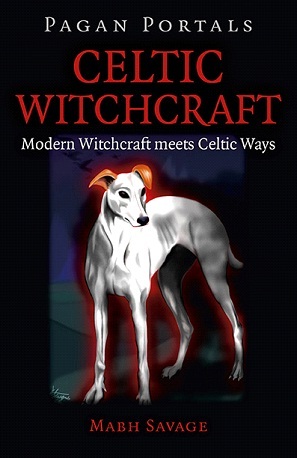Book Excerpt: Pagan Portals: Celtic Witchcraft by Mabh Savage
Book Excerpt: Pagan Portals: Celtic Witchcraft by Mabh Savage

Stepping Stones
Celtic Triad: Three candles that illumine every darkness: truth, nature, knowledge.
In magic we look to the elements, the directions and spirits among many, many other things, as a way to quantify and understand the universal energies we are harnessing. In Wicca and other ritual based on a similar foundation, the cardinal points are the focus for an individual or coven to consecrate or cast a circle; North, East, South and West, and their associated elements, respectively Earth, Air, Fire and Water. The practitioner can then go deeper to the aspects of the world associated with each element; birds of the air, or the heat of the summer sun for example.
Let’s go deeper still to understand how the directions and elements represent different parts of human nature, or our own psyche. East is about new beginnings, birth, the start of something. The freshness of a morning breeze moves us towards thinking about the element of air. The carefree and uncontrollable nature of the wind; this translates in ourselves as mischief or playfulness, childishness or embracing our inner child and un-tempered emotions both light and dark. You’ll note that I am careful to point out that each of these aspects has a flip side. There is no good and evil in Celtic Witchcraft. Everything you do has consequences and you have to be prepared for that. It’s up to you to make sure your choices affect your life and the lives of those around you in the way you intend. Hopefully this is a positive one! If you have darker designs, just remember consequences have a way of biting you in the bum when you least expect it.
At some point I’ll provide the obligatory list of elemental correspondences and how you can use them, but it’s important to note that I don’t want you to feel bound by these. Celtic Witchcraft is very much about using your instincts. Rite and ritual, tools and trinkets; these things are not necessary for you, but also they should not be shunned. Choose your own way of working, and expect it to change often, perhaps even daily at first. You are not only a witch; you are a scientist, experimenting with yourself and the world, responsibly but with healthy curiosity and a sense of adventure.
By this point we have accepted that we are a part of a huge universe and a world which seems even huger because we are so close to it, even though in reality it is a tiny speck in the eye of creation. We use directions and symbolism to break this massive, incomprehensible world into smaller chunks that are easier to understand, and as we’ve discussed, we start to relate those pieces of the world to ourselves. How does this benefit us? Why do we need to do this? Ultimately, what’s in it for you?
Well, what do you want? Why are you here? What answer eludes you? What desire is just out of reach? The Celts were seekers not only of knowledge, but of wealth, power and beauty. I’ve found that there is no shame in admitting a desire for something worldly, just as there is certain glory in seeking something divine.
“This is the way of it then” said Lugh. “The three apples I asked of you are the three apples from the Garden in the East of the World, and no other apples will do but these, for they are the most beautiful and have the most virtue in them of the apples of the whole world. And it is what they are like, they are of the colour of burned gold, and they are the size of the head of a child one month old, and there is the taste of honey on them, and they do not leave the pain of wounds or the vexation of sickness on anyone that eats them, and they do not lessen by being eaten forever.” (Gods and Fighting Men: the Story of the Tuatha de Danaan and of the Fianna of Ireland; Gregory, Lady; John Murray, London, 1910.)
Lugh, speaking here, has just lost his father. Instead of simply killing the culprits, the infamous Sons of Tuireann, he devises a plan whereby the murderers are sent on a mission that will either kill them through its sheer danger and difficulty, or if they somehow succeed, many great and powerful artifacts, such as the apples described above, will be bestowed upon Lugh. Lugh may seem somewhat cold to us; using his father’s death as a vehicle to gain power. But look at it another way. He is distraught. His father, to whom he is very close, has been brutally taken from him. He can exact revenge, or he can use the situation positively. He masters his emotions and moves everyone down a path that ultimately can only end to his advantage.
This is basically how you have to think when you work with magic. You can’t do magic angry. You can’t do magic upset. Your intent has to be pure; not pure as in good or even altruistic! But pure as in unsullied, not tainted by other thoughts and wishes that are roiling around inside your skull. You must master yourself before you can master magic. And that is why, as in all great endeavors, we start small.
If you enjoyed this, Mabh’s book is available on Amazon and other books stores.